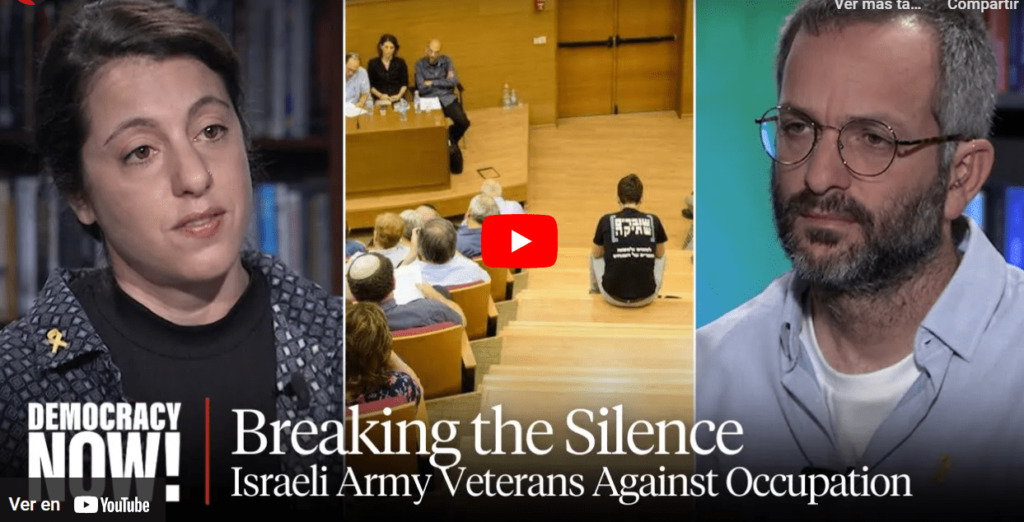
Israeli Army Veterans Tour U.S. & Canada to Speak Out Against Occupation
HAVANA TIMES – We speak with two former Israeli soldiers who are members of Breaking the Silence, an anti-occupation group of Israeli army veterans. The group’s education director, Tal Sagi, describes growing up in a settlement and joining the military without understanding what occupation was. “We’ve been told that this is security and we have to control millions of lives and we don’t have other options,” says Sagi, who says Israeli society is not open to ending the occupation. “We’re trying to say that there are other options.”
We also speak with Breaking the Silence deputy director Nadav Weiman about why the group is touring U.S. colleges and calling for a ceasefire in Gaza. “We stood in checkpoints. We raided homes. We attacked Gaza from the air. We fought from the ground,” says Weiman. “So, when you bring reality, you bring real conversation about the occupation, and you bring real conversation about Gaza.”
Transcript
AMY GOODMAN: This is Democracy Now!, democracynow.org, The War and Peace Report. I’m Amy Goodman in New York, with Juan González in Chicago.
The official death toll in Gaza has topped 33,400, including over 14,000 children, with over 76,000 people wounded. Over 1.7 million Palestinians have been displaced, around 70% of Gaza’s population, while famine is setting in. The International Court of Justice has ruled there’s plausible case Israel is committing genocide in Gaza. Meanwhile, violence by Israeli soldiers and settlers against Palestinians in the occupied West Bank has also exploded, with over 450 Palestinians killed in the last six months and at least 14 villages and towns forcibly depopulated.
Among those speaking out against the violence are Israeli soldiers themselves. Breaking the Silence is an anti-occupation group led by veterans of the Israeli army. The group was founded in 2004, 20 years ago, in the aftermath of the Second Intifada.
We’re joined right now by two members of Breaking the Silence. Nadav Weiman is the group’s deputy director. He served in the West Bank and Gaza from 2005 to 2008. And Tal Sagi is the group’s education director. She served as a soldier in Hebron, one of the largest cities in the West Bank.
We welcome you both to Democracy Now! Nadav, let’s begin with you. Why are you in the United States and then headed to Canada? And your reaction as you listen to these numbers mounting in Gaza, where you were an Israeli soldier, though albeit many years ago, over 33,000 Palestinians dead?
NADAV WEIMAN: Yeah. So, we are over here to speak about what is happening in Gaza and in the West Bank, because we believe that what is happening in the West Bank, it’s not a secret that belongs to us as soldiers. It’s something that the international community should know, because the international community is a part of it. And we saw the discourse happening over here in the States about what is happening in Israel and Palestine, and that’s why we did a campus tour the last two weeks — Tal was here with me — spoke in a lot of campuses all around, met a lot of students, because the conversation about the occupation happens everywhere, right? And we, as former soldiers, we want to be a part of it and saying supporting Israel, it’s not supporting the occupation. Supporting Israel is supporting peace for Israelis and Palestinians.
AMY GOODMAN: And, Tal, talk about your experience in the military and why you chose to be a part of Breaking the Silence. And how many former Israeli soldiers, or even current ones, do you feel, share your point of view? Occupation, I have to say, in the U.S. media, is actually rarely talked about right now.
TAL SAGI: So, it’s not only here. We are not talking about it, either. And, actually, I grew up in a settlement in the West Bank, and I served in Hebron in the West Bank. And while serving, I was a tour guide. I used to take groups of soldiers for tours in the Tomb of the Patriarchs in Hebron. And I didn’t know what occupation is, while taking these tours in this huge Palestinian city, surrounded by soldiers, and there are settlements in the middle of the city. And I didn’t know that the city is under military control, while I’m taking part of this military control, while I’m a settler myself. I didn’t know where is the Green Line or what is the Green Line or anything about these things. So, it took me a lot of time to realize that.
But the fact that I didn’t know that is not a mistake. We don’t know these things. As Israelis, we are not — we’re never taught these things, because, you know, it’s something that for years we’re taking part of and we’re doing, and we don’t want to stop controlling millions of lives of Palestinians for so many — we’re doing it for so many years, and we don’t want to stop, because we want to make sure that we have the control over the land. And we see now also how we don’t have any other future. That’s all we get. We have been told that this is security and we have to control millions of l


